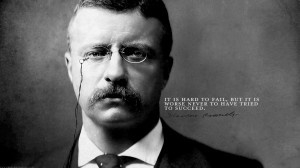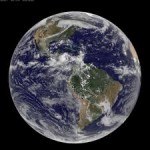I quoted Theodore Roosevelt back in the dim reaches of my “He Said/She Said” collection, but anybody can do that. Recently on Grantland, I read a piece on Don King, the once-dominant promoter in
professional boxing, in which he pulled the Man in the Arena passage that I love so well out of his well-worn pouch of salesmanship. (Heck, maybe he loves it like I do, but after all his flim-flams and showmanship and indictments, it’s hard to tell.) This isn’t about Don King, though he did get me thinking back to a November 2010 piece I wrote about wanting to be on the front lines of life, wanting to have that “face marred with dust and sweat and blood”, as Roosevelt put it in a 1910 speech, to be an embattled veteran of causes worthy and noble. At moments, sports have given me that taste. So have wild-eyed efforts as an educator. So has Shakespeare, and a growing mid-life consciousness of ecology.
Being in China helps, too, and not only when I’m bombarded by cultural noise that I still can’t get my head around, not to mention fireworks or the adrenaline rush of getting across a busy street. The Baha’i teachings I battle to live by find many responsive ears here, and its community-building processes are of blatantly obvious value. The response to both is routinely gratifying, yet given the frantic movement and
incredible size of this population, it’s all pretty darned humbling, too. I am surely not patient enough; for four years, China has done its best to teach me, but I am a slow learner. There’s a lot of that going around, as you may have noticed, particularly if you’re a climate watcher.
Recently, we’ve been thinking of the front lines of the climate wars. EnviroBride has taught me much about the crisis we’ve created in the global ecology, and the search for sustainable ways to live with and within it. We have avoided, it seems, a third World War, though Native American prophecies of the three “great shakings” that the world must undergo before the age of peace are an eerie warning.


